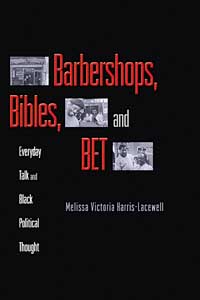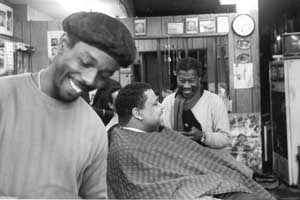Harris-Lacewell examines how the black community forms opinions, ideologies
By William HarmsNews Office
  This South Side of Chicago barbershop is one of the establishments that Quincy Mills, a doctoral candidate in History, visited to hear patrons’ informal conversations about politics and culture. |
The casual conversations African Americans have among themselves in places such as barbershops can reveal volumes about their attitudes toward politics and other issues, according to a University research project.
These venues are largely closed to whites and provide blacks with opportunities to develop distinct ideas and form identity, said the leader of the study, Melissa Harris-Lacewell, Assistant Professor in Political Science. These casual conversations provide insights into the variety of opinions among African Americans outside the more widely known positions of vocal black leaders.
Such conversations were a basis for the popular film Barbershop and its sequel, Barbershop II. Besides being entertaining, the barbershop discussions provide important information to scholars, Harris-Lacewell contended.
“To fully appreciate the political thought and action of African Americans, it is imperative to understand that these interactions are more than social. They are the spaces where African Americans jointly develop understandings of their collective interests and create strategies to navigate the complex political world,” wrote Harris-Lacewell in her forthcoming book, Barbershops, Bibles, and BET: Everyday Talk and Black Political Thought, to be published in March by Princeton University Press.
The conversations reveal ideologies, which are tied to black intellectual traditions and linked to African-American public opinion, she said.
Harris-Lacewell was joined in her work by graduate student Quincy Mills, a black male doctoral candidate in History, who spent four months hanging out in an African-American barbershop on Chicago’s South Side to listen to the patrons’ conversations.
“They talked about white power structures and the relationship of African Americans to the state and to capitalism. They critiqued black leaders, discussed the political power of the black church, argued about reparations and cheered on African-American Olympic athletes,” Harris-Lacewell said.
Through their conversations, the men revealed a great deal about what it means to be black in the American political system, how important race is to identity, to what extent blacks should solve their own problems or look for assistance, and how separate blacks should be from whites in order to advance their group interests.
The men did not agree, for instance, on how effective black-owned businesses are in helping African Americans overcome their economic problems, and they found some black-owned businesses to be inadequate in such areas as customer service, for instance. They also disagreed on white attitudes toward blacks, with some men contending whites are hostile to African Americans and others feeling whites are merely indifferent toward them.
The barbershop patrons also could not agree on who among their community members are worthy allies in the struggle for equality. Some believed that young men who stand idly on street corners are untapped resources, while others felt that such men are powerless and undependable.
The patrons also disagreed on the role of women in helping blacks achieve racial equality. Some found African-American women to be domineering and openly told their friends they preferred the company of white women. Other men said they routinely shared responsibilities at home.
The divergence of positions held by the men in the Chicago barbershop reflects survey data and experimental findings also explored in Harris-Lacewell’s book. In earlier chapters she reveals that African Americans disagree on issues of economic strategy, women’s political leadership, the role of the church in politics and goals for the future of the race.
![[Chronicle]](/images/sidebar_header_oct06.gif)